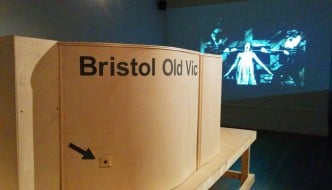Family drama in Winter Solstice: lamentation and laughter, resentment and reconciliation
February 21, 2018

Written by acclaimed German playwright Roland Schimmelpfennig, and translated by David Tushingham, Winter Solstice centres around unhappy couple Bettina (Kirsty Besterman) and Albert (Felix Hayes). It’s Christmas Eve, and Bettina’s mother Corinna (Marian McLoughlin) is here for the holiday, making things awkward. What’s more – she invites a man she’s just met, Rudolph (David Beames), to stay too. Could things really get any worse?
This production is a collaboration between critically acclaimed and award-winning companies Actors Touring Company (ATC) and the Orange Tree Theatre. ATC produce touring contemporary and international theatre, hoping to create shows that both entertain and activate the audience whilst asking questions of the world around us, and this production does just that. A year on from the original production’s debut on the eve of President Trump’s inauguration, it is as timely as ever, playing with ideas of modern day fascism, of belief, and of societal insecurity.
The play presents multiple tensions and truths, and to tell you the truth, I find myself feeling quite uncomfortable at times. On the one side, there is the comical and awkward family drama that – familiar to all – has the audience laughing out loud at points. Yet there is also the sad truth of a marriage on the verge of breaking down, and the betrayal that comes with it.
Against this backdrop, there is the caricature of a stranger that subtly but undeniably, despite unnerving statements reminiscent of an age gone by, wins the household over. He is no hero, however. It’s frustrating to watch Albert in disarray through almost the entirety of the play. Before your very eyes, you see the one hope of giving sight to the blind crumble. By the end of the play, the audience finds themselves aligned with Bettina’s previously apparently nonchalant line: “She hates him for something she used to love him for – his softness, which she now calls cowardice.”
The extremely clever script by Schimmelpfennig is flawlessly and convincingly delivered by the cast who are all wonderfully on beat and in sync. Awkward pauses, slapstick moments, and witty lines hit a perfect comic note. Each actor plays both narrator and their respective characters. They explore their character’s thoughts in third person and set the scene through spoken dialogue, almost giving it the feel of a novel. And yet, whilst having a literary feel, Winter Solstice is at times also film-like, using the scene-setting dialogue and minimal use of sound and lighting to maximum effect. Adding to this feel are quick-paced choppy scene changes. It sometimes left me feeling like I was scrambling to keep up. I think that’s the point. It is only one of many smoothly executed elements that keeps the audience transfixed, thinking, ‘What is really going on here?’.
The set itself is nothing more than old office swivel chairs among cheap tables, on which lie a vast array of mundane items: stationary, glasses, jugs, bottles of water, empty sweet wrappers, and containers. But through reactive narration and the audience’s own imagination, each piece is made to be an item of significance in the story. The use of props is ingenious – often the base of comic moments and accentuating amusingly awkward instances. It manifests the concept of symbolism to its very core, embodying Konrad’s (Gerald Kyd) line: “A paintbrush is a paintbrush. It’s what you do with it that counts”.
The straight run through of one hour fifty with no interval seems to fly by. The whole while you find yourself simultaneously entertained and in deep thought, something all good plays should do. ATC director Ramin Gray and Alice Malin, director of this revival, execute a wonderfully seamless production, balancing entertainment and philosophy. It’s not something I’d normally be inclined to see, but, now I have, I urge you to too.
Filed under: Theatre & Dance
Tagged with: art, Christmas Eve, drama, Failed Marriage, HOME, homemcr, manchester, Marriage, narration, North West, One night drama, play, theatre, Winter Solstice



Comments